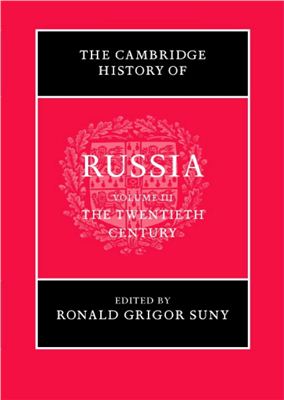Cambridge: Cambridge University Press, 2006. - 866 p.
The third volume of The Cambridge History of Russia provides an authoritative political, intellectual, social and cultural history of the trials and triumphs of Russia and the Soviet Union during the twentieth century. It encompasses not only the ethnically Russian part of the country but also the non-Russian peoples of the tsarist and Soviet multinational states and of the post-Soviet republics. Beginning with the revolutions of the early twentieth century, chapters move through the 1920s to the Stalinist 1930s, World War II, the post-Stalin years and the decline and collapse of the USSR. The contributors attempt to go beyond the divisions that marred the historiography of the USSR during the Cold War to look for new syntheses and understandings. The volume is also the first major undertaking by historians and political scientists to use the new primary and archival sources that have become available since the break-up of the USSR.
The third volume of The Cambridge History of Russia provides an authoritative political, intellectual, social and cultural history of the trials and triumphs of Russia and the Soviet Union during the twentieth century. It encompasses not only the ethnically Russian part of the country but also the non-Russian peoples of the tsarist and Soviet multinational states and of the post-Soviet republics. Beginning with the revolutions of the early twentieth century, chapters move through the 1920s to the Stalinist 1930s, World War II, the post-Stalin years and the decline and collapse of the USSR. The contributors attempt to go beyond the divisions that marred the historiography of the USSR during the Cold War to look for new syntheses and understandings. The volume is also the first major undertaking by historians and political scientists to use the new primary and archival sources that have become available since the break-up of the USSR.

